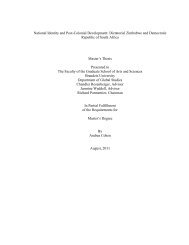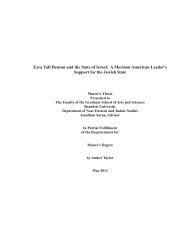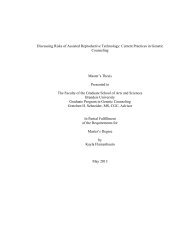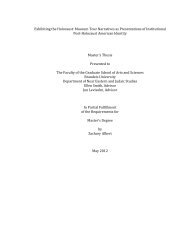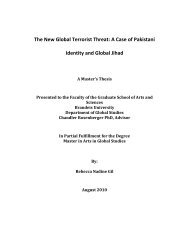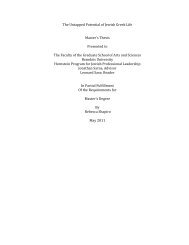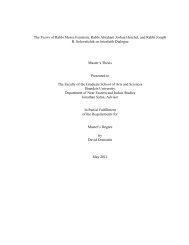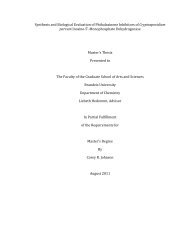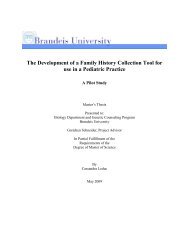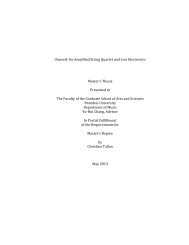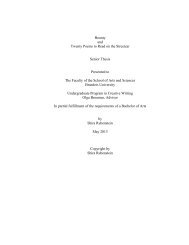assessment is valid, but it had little relevance to <strong>the</strong> new situation <strong>in</strong> <strong>the</strong> <strong>Congo</strong> anddemonstrated a dangerous way of th<strong>in</strong>k<strong>in</strong>g about neutralism, which closely resembledSecretary of State John Foster Dulles’ previous judgment, <strong>in</strong> 1956, that neutralism <strong>in</strong> <strong>the</strong>develop<strong>in</strong>g world was “a transitional stage to communism.” 4In <strong>the</strong>ir aforementioned report, dated December 30, 1960, <strong>the</strong> members of <strong>the</strong>Task Force concluded that “<strong>the</strong> Soviet Union is ready to give unilateral assistance (quiteapart from <strong>the</strong> UN) to any regime friendly to its advances. It is probably giv<strong>in</strong>gsubstantial aid to <strong>the</strong> pro-Lumumba government <strong>in</strong> Stanleyville.” 5 However, Sovietsources reveal that Khrushchev refused to provide aid to Gizenga after Lumumba’simprisonment despite frantic requests for “direct Soviet <strong>in</strong>terference.” On December 14,1960, only days after sett<strong>in</strong>g up his government <strong>in</strong> Stanleyville, Gizenga asked <strong>the</strong>Soviets “immediately, without delay, to help us <strong>in</strong> military equipment and foodstuffs,” as“Stanleyville Prov<strong>in</strong>ce is <strong>in</strong> serious danger.” 6 Not receiv<strong>in</strong>g a satisfactory response, asubsequent telegram called out <strong>the</strong> Russians for <strong>the</strong>ir “passivity” and asked “Why can <strong>the</strong>USSR not help <strong>the</strong> legitimate and democratic government that enjoys <strong>the</strong> support of <strong>the</strong><strong>Congo</strong>lese?” 7 One can understand why <strong>the</strong> Task Force would have expected cont<strong>in</strong>uedSoviet <strong>in</strong>volvement, s<strong>in</strong>ce <strong>the</strong>y did not have access to <strong>the</strong>se reveal<strong>in</strong>g exchanges, but <strong>in</strong>overestimat<strong>in</strong>g <strong>the</strong> danger of communist takeover, <strong>the</strong>y were just cont<strong>in</strong>u<strong>in</strong>g <strong>the</strong> mistakesof <strong>the</strong> previous <strong>Adm<strong>in</strong>istration</strong>.<strong>The</strong> first months of 1961 also saw <strong>the</strong> United States cont<strong>in</strong>ue its policy of timidlyexpress<strong>in</strong>g dissatisfaction with Belgium for keep<strong>in</strong>g so many of its advisers <strong>in</strong> Katanga.4 Qtd. <strong>in</strong> Thomas J. Noer, “New <strong>Frontier</strong>s and Old Priorities <strong>in</strong> Africa,” <strong>in</strong> <strong>Kennedy</strong>’s Quest for Victory:American Foreign Policy, 1961-1963 (New York: Oxford University Press, 1989), 2555 Report of Task Force on Africa, Pre-Presidential Files, Box 1073, Folder 26 Qtd. <strong>in</strong> Mazov, A Distant Front <strong>in</strong> <strong>the</strong> Cold War, 1277 Qtd. <strong>in</strong> Mazov, A Distant Front <strong>in</strong> <strong>the</strong> Cold War, 12943
George Allen, Assistant Secretary of State under Eisenhower, had stated <strong>in</strong> 1956 that “allof <strong>the</strong> so-called colonial powers are our friends <strong>in</strong> <strong>the</strong> worldwide contest between <strong>the</strong>Free and Communist worlds.” 8 While largely true, it is a problematic statement,reflect<strong>in</strong>g a worldview dest<strong>in</strong>ed to alienate <strong>the</strong> emerg<strong>in</strong>g nations of Africa aga<strong>in</strong>st <strong>the</strong>Eisenhower <strong>Adm<strong>in</strong>istration</strong>. It is just ano<strong>the</strong>r rem<strong>in</strong>der why so many <strong>in</strong> Africa were gladto see <strong>Kennedy</strong>, who had so effectively scored po<strong>in</strong>ts aga<strong>in</strong>st <strong>the</strong> Republicans for <strong>the</strong>irrecord on <strong>the</strong> cont<strong>in</strong>ent, take over as leader of <strong>the</strong> free world. Unfortunately, <strong>the</strong> <strong>Kennedy</strong><strong>Adm<strong>in</strong>istration</strong> did not live up to <strong>the</strong> hopes for a New <strong>Frontier</strong> <strong>in</strong> Africa. In <strong>the</strong> months ofFebruary to May 1961, <strong>Kennedy</strong> allowed <strong>the</strong> situation <strong>in</strong> <strong>the</strong> <strong>Congo</strong> to play out, whileexpress<strong>in</strong>g reluctance to upset NATO allies <strong>in</strong> Brussels by push<strong>in</strong>g too hard on Katanga.It was only dur<strong>in</strong>g <strong>the</strong> summer, when <strong>the</strong> Belgians elected a new government thatrecognized <strong>the</strong> tide was turn<strong>in</strong>g aga<strong>in</strong>st Tshombe, that <strong>the</strong> U.N. began to take action withtacit American approval. 9Although <strong>Kennedy</strong> would later demonstrate his discomfort with a BelgiansupportedKatanga, he showed a will<strong>in</strong>gness to accept Tshombe’s unpopular secessionistregime <strong>in</strong> Elisabethville that belied his pre-<strong>in</strong>auguration reputation of strong opposition tocont<strong>in</strong>ued European imperialism <strong>in</strong> Africa. But, like <strong>the</strong>ir predecessors underEisenhower, officials <strong>in</strong> <strong>the</strong> <strong>Kennedy</strong> <strong>Adm<strong>in</strong>istration</strong> were ready to deal with Tshombe,and even court him at times, because of <strong>the</strong> moderate, anti-radical presence that he couldprovide until <strong>the</strong> emergence of a permanent government acceptable to <strong>the</strong> U.S. It iscurious that his decision not to address <strong>the</strong> problem of Belgium and Katanga for so long,particularly after Tshombe was implicated <strong>in</strong> Lumumba’s murder, did not do more8 Qtd <strong>in</strong> Noer, “New <strong>Frontier</strong>s and Old Priorities <strong>in</strong> Africa,” 2559 Weissman, American Foreign Policy <strong>in</strong> <strong>the</strong> <strong>Congo</strong>, 14744
- Page 3: TABLE OF CONTENTSIntroduction 1Chap
- Page 6 and 7: adical and his party had won a plur
- Page 8 and 9: Kennedy intended it to apply to for
- Page 10 and 11: in terms of American interest or to
- Page 12 and 13: found a precedent in the actions of
- Page 14 and 15: willingness to tolerate him because
- Page 16 and 17: advisers were paying much attention
- Page 18 and 19: A year later, responding to the pre
- Page 20 and 21: On July 11, a few events dramatical
- Page 22 and 23: Gizenga was a committed Marxist, mo
- Page 24 and 25: Bandung Conference to offer a third
- Page 26 and 27: the U.S.S.R. in the Congo: “For t
- Page 28 and 29: Indeed, Lumumba was a wild card, an
- Page 30 and 31: position from which they conspicuou
- Page 32 and 33: Lumumba’s erratic personal added
- Page 34 and 35: the President, especially in writte
- Page 36 and 37: took to the airwaves to dismiss Pri
- Page 38 and 39: to outside world that Lumumba was b
- Page 40 and 41: embassies of the U.S.S.R. and Czech
- Page 42 and 43: ather than take a ministerial post
- Page 44 and 45: Chapter Two:LEOPOLDVILLEEvents in t
- Page 48 and 49: damage to his reputation among Afri
- Page 50 and 51: U.S. Ambassador Clare Timberlake su
- Page 52 and 53: would not respond any better to a n
- Page 54 and 55: about a greater degree of Congolese
- Page 56 and 57: will place yet another strain on NA
- Page 58 and 59: Once again, however, State Departme
- Page 60 and 61: overstepped their influence by tryi
- Page 62 and 63: ecommends that we permit the presen
- Page 64 and 65: States would only accept the best o
- Page 66 and 67: government was “as good as we cou
- Page 68 and 69: he wants Katanga to stay in Congo a
- Page 70 and 71: Chapter Three:ELISABETHVILLEThe Con
- Page 72 and 73: stability in Katanga, and in neighb
- Page 74 and 75: eminder of the low priority that Ei
- Page 76 and 77: gentle and realistic tack with the
- Page 78 and 79: without too much damage in Europe.
- Page 80 and 81: also warned the State Department ab
- Page 82 and 83: military action from turning into a
- Page 84 and 85: The events of August 1960 impressed
- Page 86 and 87: pointed out he had taken major risk
- Page 88 and 89: announced to the press that “this
- Page 90 and 91: evidence for such an outcome. On th
- Page 92 and 93: after the cease-fire, leading to th
- Page 94 and 95: especially by Union Miniére, which
- Page 96 and 97:
ConclusionEvents in the Congo turne
- Page 98 and 99:
Congo crisis began well before Amer
- Page 100 and 101:
BibliographyHoskyns, Catherine. The





